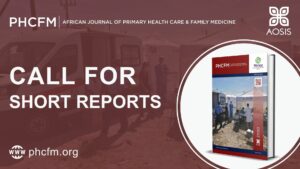Call for short reports: African Journal of Primary Health Care and Family Medicine
We call on all authors to participate in this years’ topical short report collections.
Title: The impact of climate change on primary health care in Africa
Climate change is already affecting the African continent and the health of its people. Climate change has an impact on health both directly and indirectly. Directly, extreme weather events such as cyclones, fires, floods and heat waves may cause disasters or immediate health consequences. Such extreme events may cause acute trauma, disrupt health services and other infrastructure, displace people from their homes and lead to longer-term mental and physical health issues. Indirectly, climate change may influence health through the effects of drought, changes in water quantity and quality, air pollution, increased food insecurity and malnutrition, and changes to the vectors responsible for infectious diseases. Climate change also contributes towards conflict over resources and migration of populations. Often climate change is one of a number of factors that impact health.
In Africa, the health consequences of climate change are under-documented and globally these consequences are often sidelined in the discourse on climate change. Changes in the burden of disease will show up in primary health care and changes in the underlying social and environmental determinants of health in communities served by primary health care. For example, primary care providers may see the immediate effect of extreme weather events or the indirect effects on malnutrition, gastroenteritis, malaria, schistosomiasis, trauma, allergies and mental health disorders. Climate change may also challenge service delivery and require services to adapt or become more resilient, for example to accommodate migrants or new diseases that were not previously encountered.
In high-income countries, health services are also a significant contributor to greenhouse gas emissions. African primary health care is not a major contributor to climate change, but as health systems develop they need to be mindful of responsible consumption. There may be examples of how primary health care can develop in more sustainable and responsible ways. For example, the use of solar energy in remote locations.
Our call for short reports on the impact of climate change on primary health care in Africa takes place in the same year that Africa will host the UN Climate Change Conference in November 2022 (UNFCCC COP 27) in Egypt.
Family physicians and primary care providers are often aware of health issues in their communities that have climate change as an underlying cause or contributor, but do not have the capacity to conduct formal research on what is happening. This call for short reports provides an opportunity for you to highlight or tell the story of what is happening in your community.
In this call, we would like family physicians or primary care providers in the African context to share their stories as short reports in order to create a collection of narrative evidence on the impact of climate change. This can also guide future research and case studies.
Short reports should:
- Briefly describe your primary health care context or setting
- Describe the changes in morbidity or mortality seen in primary health care
- Describe how these changes are linked to climate change
- Describe any impact of this on primary health care service delivery
- If possible provide some evidence or data to support the narrative above
- Reflect on the implications for primary health care now and in the future
- Conclusion
Reports should describe actual experiences and their effects on health services. Reports that are only theoretical or philosophical will not be considered. Reports should be 800-1500 words, have no more than 1-2 Figures or Tables, a 250 word unstructured abstract, and 20 references or less. The usual publication fees and opportunities for waivers will apply. Reports will be peer reviewed.
Deadline for submissions: 31 July 2022
Manuscript Information
Manuscript contributions may consist of the following:
- Manuscript submissions should be in English.
- Short Reports must fully comply with the guidelines for manuscripts (unstructured abstract and headings style formats: 800-1000 words, maximum of 20 references with limited self-referencing; and an abstract, with a maximum of 250 words).
- Interested authors must consult the journal’s guidelines for manuscript submissions at https://bit.ly/3uO8obT prior to submission.
Submission Procedure
To submit your article to the special issue, go to https://phcfm.org. When you submit the article, select the ‘Short Reports – Special Collection: The impact of climate change on primary health care in Africa’ as the article type. The submission portal will be accessible on https://phcfm.org after login with your personal user credentials. For more details on the editorial procedures, go to https://bit.ly/3Jq44Uf. All submissions will undergo editorial review to guarantee high scientific quality and relevance to the subject. Final decision regarding acceptance/revision/rejection will be based on the reviews received from the reviewers and at the sole discretion of the Editor-in-Chief.
Of course, we will be happy to provide you with any assistance during the submission and application process. Kindly enquire at submissions@phcfm.org
We would be honoured to receive a positive reply from you and look forward to your feedback on our proposal.

